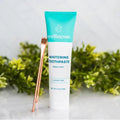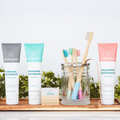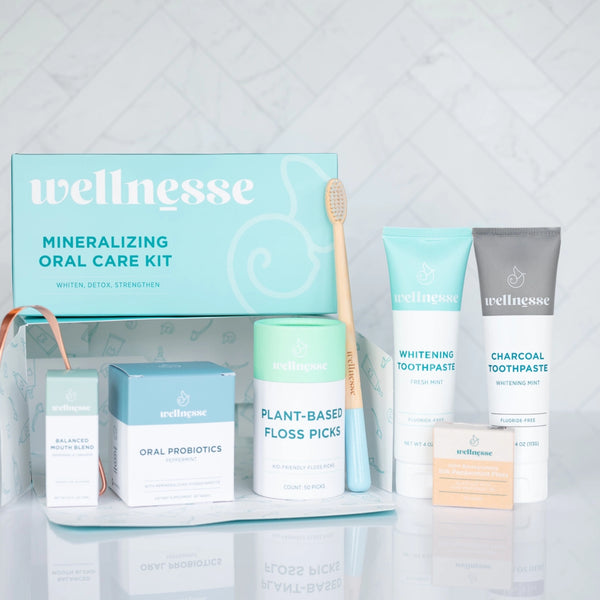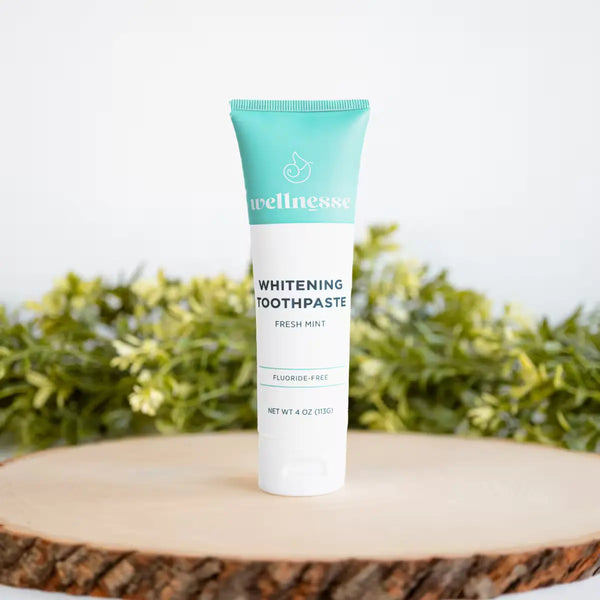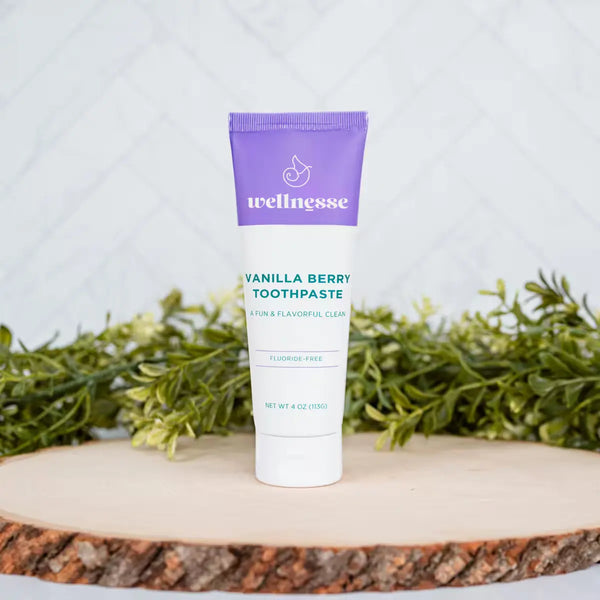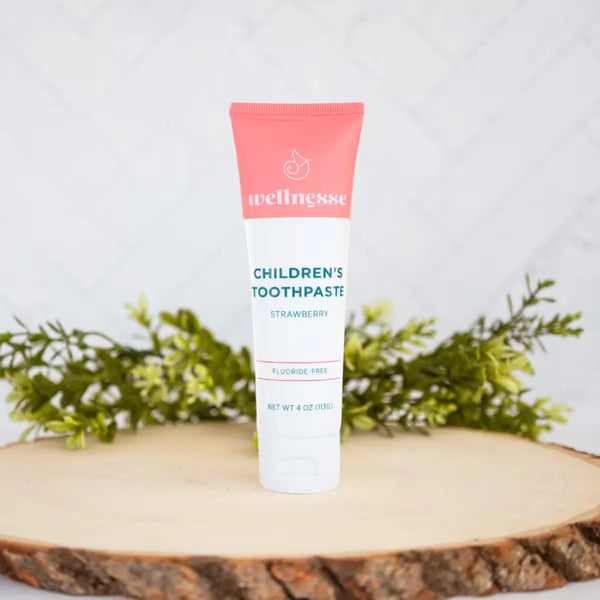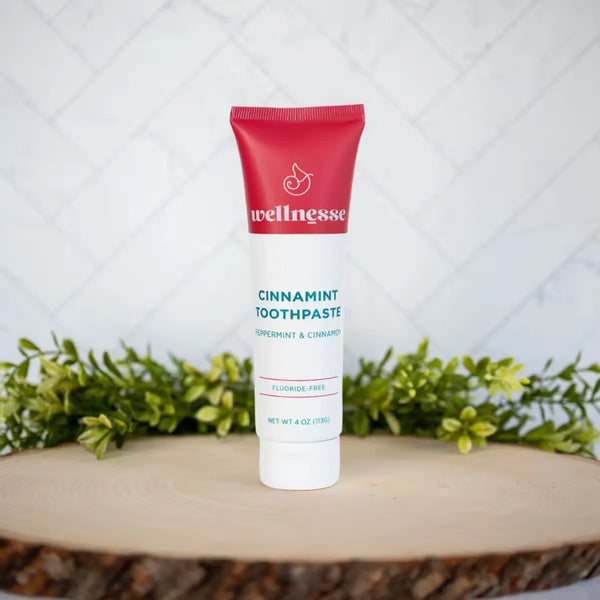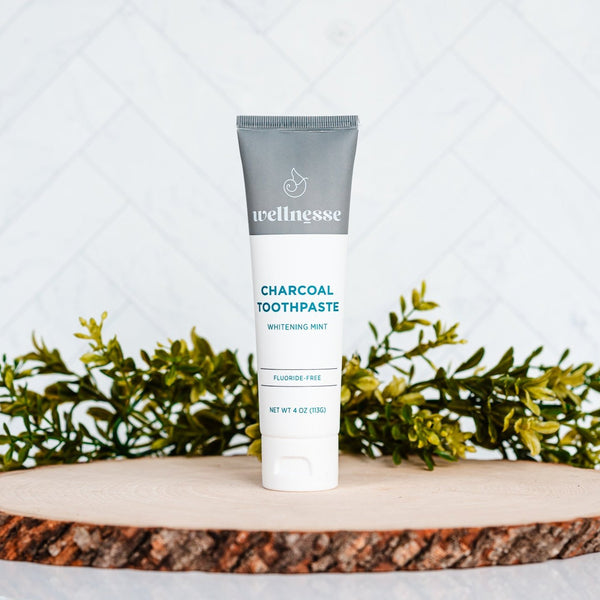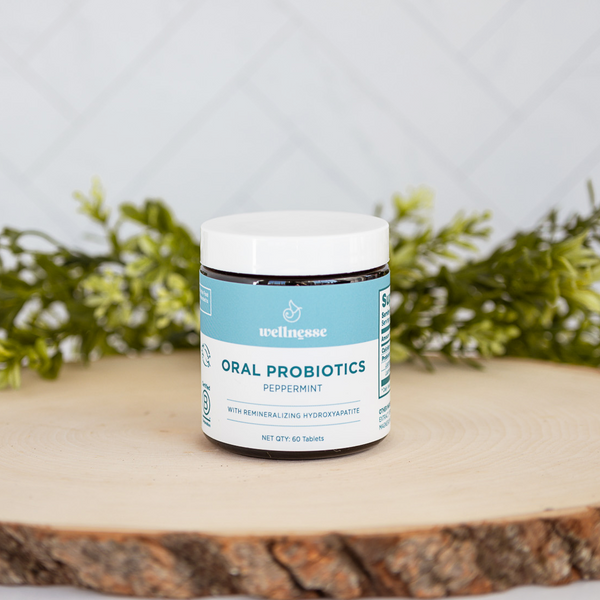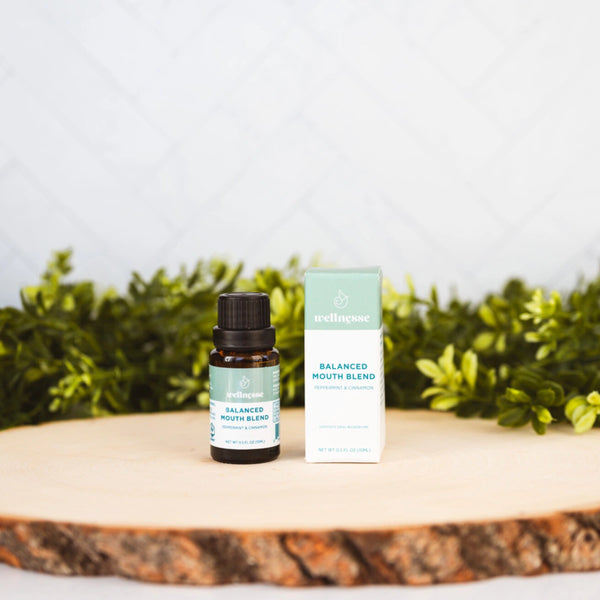Brushing with charcoal? It might sound counterintuitive to use a pitch-black paste to polish one’s pearly whites. Yet from social media influencers to health stores, charcoal oral care products have skyrocketed in popularity in recent years. Advocates rave about various charcoal toothpaste benefits, claiming everything from whiter teeth to a “detoxified” mouth. The idea of a black toothpaste for whitening teeth may raise eyebrows, but this trend taps into a growing desire for natural alternatives in oral hygiene.
What Is Activated Charcoal?
Charcoal toothpaste’s key ingredient is activated charcoal, a form of carbon that has been processed to have an extremely porous texture. Unlike the briquettes used in your grill, activated charcoal is made by heating carbon-rich materials to very high temperatures, then “activating” them with oxidizing gases or steam. This process creates a fine black powder with a huge surface area full of microscopic pores. For perspective, a small amount of activated charcoal contains so many pores that its total surface area can rival that of a football field. These pores give charcoal an exceptional ability to bind and trap other substances.

In medicine, activated charcoal is well-known for adsorbing (binding) toxins – it’s been used in emergency rooms for decades to treat certain poisonings or overdoses by capturing poisons in the gut before they can be absorbed. The same binding property is the reason charcoal has made its way into toothpaste. The theory is that those countless pores can latch onto compounds that cause stains or odor in the mouth, effectively “soaking up” impurities and plaque. The charcoal particles are mixed into a paste where they can come into contact with the teeth and gums. As you brush, the fine charcoal powder may bind to tannins and pigments from foods like coffee, tea, or wine, and also to bacteria or toxins in the mouth, carrying them away when you rinse. Charcoal is a mild abrasive. The gritty texture can scrub away surface stains on enamel in much the same way standard whitening toothpastes use silica or baking soda as polishing agents.
It’s important to note that activated charcoal itself is odorless and tasteless, so it doesn’t contribute a flavor. Charcoal toothpastes typically include familiar ingredients like mint or cinnamon for flavor, plus binders and sweeteners to form a normal paste consistency. They also often rely on other natural additives in keeping with a “chemical-free” image. Because charcoal is derived from natural sources, many people consider these products to be a natural charcoal toothpaste option compared to conventional formulas loaded with synthetic chemicals.
History of Charcoal in Dental Care
The use of charcoal for teeth cleaning is far from a new fad – it actually has ancient roots. Charcoal and similar ashes have been used in oral hygiene for thousands of years across different cultures. Early records show that ancient Romans brushed their teeth using powders that included charcoal (along with ingredients like crushed bones or tree bark). Charcoal was even featured in a 19th-century English homemaker’s recipe for toothpaste. For much of human history, before the advent of modern toothpastes, people found that charcoal’s abrasive properties could help scour away stains and freshen breath. Both the Greeks and Romans believed charcoal powders could clean teeth and sweeten the breath by absorbing impurities.
Charcoal remained a common ingredient in tooth powders and early toothpastes through the 1800s. It wasn’t until the mid-20th century, when commercial toothpaste brands began favoring newly developed laboratory abrasives and additives, that charcoal fell out of favor. For decades, brushing with charcoal was forgotten. However, in the past few years, charcoal has made a dramatic comeback as consumers have “rediscovered” this historic dental cleaner. With growing skepticism toward chemicals in personal care products, many are returning to age-old substances like charcoal.
Benefits of Charcoal Toothpaste
Manufacturers and fans tout a number of appealing benefits. Some of the commonly advertised benefits include:
-
Whitening teeth naturally: Charcoal is said to remove stains from coffee, tea, wine, and smoking, leading to a brighter smile without chemical bleaches. Proponents claim charcoal teeth whitening can make teeth appear several shades lighter by polishing away discoloration.
-
“Detoxifying” the mouth: Many charcoal oral care products market themselves as detox agents. The idea is that activated charcoal binds to toxins and bacteria in the mouth, helping to eliminate bad breath and create a healthier oral environment. In theory, it may absorb compounds that cause odors or gum irritation, acting like a magnet for impurities.
-
Fighting plaque and bacteria: Some products assert that charcoal’s antibacterial and antifungal properties help prevent plaque buildup and gum disease. By adsorbing microorganisms and their waste products, charcoal toothpaste might reduce the bacterial load in your mouth, contributing to better overall oral health.
-
Freshening breath: Because of its porous structure, activated charcoal can absorb odor-causing molecules. Fluoride-free charcoal toothpaste is often claimed to neutralize bad breath more effectively than regular toothpaste, leaving the mouth “extra clean” and breath fresher.
-
Natural, chemical-free formula: Another major appeal is that charcoal pastes are typically marketed as fluoride-free natural toothpaste alternatives. They tend to omit ingredients like peroxide, triclosan, SLS, or artificial dyes and flavors. For consumers seeking a more natural or plant-based whitening toothpaste, charcoal fits the bill – the charcoal itself comes from plant materials, and many brands pair it with herbal extracts and essential oils. This also ties into an eco-friendly toothpaste image, as charcoal is biodegradable, and sourcing it can be sustainable.
Charcoal oral care can be an appealing addition for those drawn to gentle whitening toothpaste options, provided it complements rather than replaces regular fluoride-based treatments recommended by dental professionals.
Alternative Teeth Whitening Methods
One popular category is whitening toothpastes that contain active ingredients specifically designed to target stains. Many modern whitening toothpastes use chemical agents such as hydrogen peroxide or blue covarine. Hydrogen peroxide is a mild bleaching agent that penetrates the enamel to break down both surface and some deeper stains, leading to gradual lightening of the teeth over time. Blue covarine works differently: it deposits a thin blue film on the teeth, creating an optical illusion that makes teeth appear whiter immediately after brushing.
Whitening strips are another standard at-home option. These thin, flexible pieces of plastic are coated with a peroxide-based whitening gel and are applied directly to the teeth for a set period, usually once or twice daily for one to two weeks. Whitening strips can be more effective than toothpaste alone because the gel remains in contact with the teeth for longer, allowing for deeper stain removal. Most users notice a visible difference after a full course of treatment. However, they may cause temporary tooth sensitivity or gum irritation, so it’s important to follow the instructions carefully and avoid overuse. For those seeking the most noticeable and rapid results, in-office or dentist-supervised whitening treatments are the gold standard. Professional whitening procedures use more substantial concentrations of bleaching agents than are available in consumer products. Dentists may also use special lights or lasers to accelerate the whitening process. These treatments can lighten teeth several shades in a single visit, making them ideal for individuals looking for immediate improvement.
Does Charcoal Toothpaste Whiten Teeth?
There’s no doubt that after brushing with charcoal, your teeth can feel very clean – the abrasive action can remove recent surface stains and plaque, giving a polished look. If you drink a lot of coffee or red wine, a charcoal toothpaste might indeed scrub away that thin film of discoloration that develops on the enamel. Short-term brightness is possible; some users report a noticeably cleaner, brighter smile after a few uses. This aligns with the fact that activated charcoal can lift extrinsic (surface) stains due to its abrasive scrubbing and mild absorptive action on pigments.
Enamel Abrasion and Damage Concerns
Charcoal particles are scratchy by nature, and under a microscope, the powder consists of tiny jagged grains of carbon. If you choose to use charcoal toothpaste, use it sparingly and brush gently with a soft-bristle brush. The goal is to minimize unnecessary abrasion. Charcoal should not be ground hard into the teeth – a light polish is sufficient to get the effect. It’s also wise to alternate with a regular non-fluoride toothpaste.

Natural and Eco-Friendly Appeal
There’s no denying that the concept of brushing with a simple substance derived from plant materials has a certain appeal compared to using a bright blue chemical gel. The activated charcoal in these toothpastes typically comes from natural sources like wood or bamboo – essentially renewable resources. This makes it a plant-based whitening toothpaste ingredient, aligning with vegan or plant-derived product preferences. For individuals trying to avoid animal products or harsh synthetics, charcoal fits neatly into a holistic lifestyle.
For consumers seeking alternatives to conventional dental products, many charcoal toothpaste brands highlight their natural formulas. These brands often include a carefully chosen array of botanicals and natural compounds to enhance the charcoal's abrasive and adsorptive qualities. This thoughtful approach aims to provide a thorough cleaning while minimizing exposure to synthetic ingredients, offering a more holistic approach to oral hygiene.
-
Antimicrobial Oils: Coconut oil and tea tree oil are frequently incorporated into these natural formulas. Coconut oil is valued for its antimicrobial properties, which help to soothe oral tissues and fight bacteria. Tea tree oil, a potent antiseptic, further assists in combating bacteria responsible for bad breath and gum problems, contributing to a healthier oral environment. This combination leverages nature's power to promote overall oral well-being without relying on harsh chemicals found in traditional toothpastes.
-
Mineral-Rich Cleansers: Baking soda and various clays, such as bentonite or kaolin, are common additions that provide multiple benefits. Baking soda acts as a mild abrasive, aiding in teeth whitening, and also serves as a neutralizing agent to balance oral pH. Clays contribute valuable mineral content and offer a gentle cleansing action, helping to remove impurities and leave teeth feeling clean without harsh scrubbing.
-
Refreshing Herbal Extracts: Herbal extracts like peppermint, spearmint, or eucalyptus are often included for their refreshing flavors and additional therapeutic properties. Beyond providing a pleasant taste and fresh breath, these extracts offer antiseptic and anti-inflammatory benefits, which can help soothe gums and reduce irritation.
They also tend to be free of artificial sweeteners, dyes, and preservatives. This can be a relief for those worried about ingesting chemical residues or who have sensitivities to standard toothpaste components. The simplicity of ingredients is a selling point. In this sense, using a charcoal paste can feel like a return to basics – scrubbing your teeth with earth-derived materials much like our ancestors did. For consumers who prioritize clean beauty or wellness products, a natural charcoal toothpaste bundle checks a lot of boxes.
The eco-friendly toothpaste angle comes into play in a few ways. First, the sourcing of charcoal can be sustainable. Some companies use charcoal made from coconut shells, which repurposes a waste product of the food industry. Second, charcoal is biodegradable, so the small amount you spit out won’t linger in the environment or water supply in the way certain chemicals might. (By contrast, some conventional toothpastes in the past contained plastic microbeads for scrubbing, which were an environmental hazard until they were banned.) Also, brands selling charcoal toothpaste often extend the eco-friendly philosophy to their packaging – you might find options packaged in recyclable or minimalist materials, or powder forms sold in glass jars instead of plastic tubes.
New Formulations and Alternatives in Charcoal Toothpastes
Newer charcoal whitening toothpaste formulations are emerging that attempt to offer the best of both worlds: natural ingredients along with protective benefits from modern dental science. For example, some brands now include remineralizing agents such as calcium phosphate or hydroxyapatite in their charcoal toothpastes. Hydroxyapatite is a mineral compound that makes up tooth enamel, and it’s been shown to help strengthen and rebuild enamel in a similar way to fluoride. By adding it to a charcoal paste, companies aim to counteract the loss of fluoride and even mitigate the effects of abrasion by continuously restoring mineral content to the teeth. One example is Wellnesse, which offers a charcoal toothpaste that is a fluoride-free natural toothpaste formulated with micro-hydroxyapatite to reinforce enamel while the activated charcoal lifts stains. Modern toothpastes can still capitalize on charcoal’s natural cleaning ability but also provide critical cavity protection and reduced sensitivity.
Another improvement has been in the particle size and quality of charcoal used. Early charcoal powders for teeth (and some cheap current ones) had relatively large, rough particles, which increased the abrasivity. Higher-end formulations use ultra-fine milled charcoal to make the paste gentler on enamel. Combined with other polishing agents like hydrated silica, the paste can be effective at stain removal without being excessively harsh.
Additionally, we see hybrid products on the market, such as charcoal floss or charcoal-infused toothbrush bristles, which aim to deliver some charcoal benefits in a gentler manner. While the efficacy of those is debatable, it shows how charcoal has become a versatile trend in oral care. Some toothpastes combine charcoal with mild whitening peroxide or with blue covarine to get immediate results along with charcoal’s longer-term stain adsorption. These combinations indicate an effort to marry natural and conventional whitening methods.
For those intrigued by charcoal but cautious about its drawbacks, an alternative approach is to use a charcoal tooth powder occasionally in addition to regular toothpaste. A tooth powder can be used once in a while for an extra polish. Because you’re not using it as often, the risks are minimized. Always ensure the powder is excellent and brush lightly.
The initial wave of products focused on the novelty of the ingredient; the next wave is focusing on safety and holistic efficacy. A well-formulated toothpaste can indeed be part of a healthy oral care regimen. The key is finding one from a trusted brand that has addressed issues like remineralization and abrasivity. Wellnesse’s charcoal toothpaste pairs activated charcoal with hydroxyapatite and other natural antibacterials like neem and green tea. This kind of formulation shows that it’s possible to enjoy the “detoxifying boost” of charcoal without compromising on protecting your teeth.

Charcoal toothpaste is a fascinating blend of old remedy and new trend. We’ve seen that it offers a natural way to clean and polish teeth, potentially lifting surface stains and freshening breath. If you’re curious, there’s no harm in trying a charcoal paste as a supplement to your normal routine. Use it occasionally for an extra-deep clean or before events where you want your smile looking its best. Many people enjoy the ultra-clean “slick” feeling it gives their teeth. Dentists often recommend using it at most a few times per week, rather than twice a day.
When selecting a toothpaste, do a bit of homework. Look for products that mention tested low abrasivity or that contain remineralizing ingredients. It helps to choose a reputable brand that transparently lists its ingredients. You might also consider one that isn’t purely charcoal – for example, a combo formula with hydroxyapatite if cavity protection is a concern. From a practical standpoint, charcoal toothpaste can be a bit messier than regular paste – that black color may spot your sink or towel, so rinse thoroughly. The good news is that any black residue in the mouth does rinse out and won’t stain your teeth.
Charcoal toothpaste exemplifies the trade-offs in the world of natural remedies. It provides a chemical-free cleaning experience that many find appealing and can contribute to a brighter smile by removing surface gunk. Used wisely, charcoal toothpaste can be one more tool in your oral care toolkit, giving you that extra edge of clean in a natural way. As with any dental product, listen to your teeth. A healthy smile is ultimately about balance: good brushing and flossing habits, regular dental check-ups, a tooth-friendly diet, and using products that complement your individual needs. Charcoal can have a place in that balanced routine if you enjoy it, all while keeping your smile safe and shining.
Sources:
-
Southwest Celebrity Smiles – “Does Charcoal Toothpaste Work? What You Need to Know Before You Try It” (May 2025) mycelebritysmiles.commycelebritysmiles.com
-
Live Science – Rachel Ross, “What Is Activated Charcoal?” (Oct 2019) livescience.comlivescience.com
-
Colgate Oral Care – “Does Charcoal Toothpaste Work?” (Colgate.com) colgate.com
